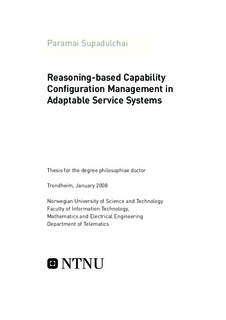| dc.contributor.author | Supadulchai, Paramai | nb_NO |
| dc.date.accessioned | 2014-12-19T14:11:31Z | |
| dc.date.available | 2014-12-19T14:11:31Z | |
| dc.date.created | 2008-05-07 | nb_NO |
| dc.date.issued | 2008 | nb_NO |
| dc.identifier | 124303 | nb_NO |
| dc.identifier.isbn | 978-82-471-6034-3 | nb_NO |
| dc.identifier.uri | http://hdl.handle.net/11250/261476 | |
| dc.description.abstract | Networked Service Systems are considered. Services are realized by service components, which by their inter-working, provide a service in the role of a service provider to service users. During more than two decades, networked service systems have been an important research topic. Focus was on efficiency in the definition, deployment and execution of services. This focus now has been changed into adaptability.
Adaptable service systems are service systems that are able to adapt dynamically to changes in time and position related to users, nodes, capabilities, system performance, changed service requirements and policies.
This thesis has focus on adaptability aspects related to capabilities. A capability is defined here as an inherent property of a node, which is used as a basis for implementing a service.
Goal adaptability properties of an adaptable service system can be classified as general and core properties. The general properties are requirement to the architectural framework while the core properties are requirement to the functionality. The core properties are classified as i) re-arrangement flexibility, ii) failure robustness and iii) resource load awareness and control properties.
The realization of the goal adaptability properties both needs an appropriate architectural framework as well as management functionality. This thesis presents a solution framework for reasoning-based capability configuration management for adaptable service systems. This framework is defined to consist of five contributions. Each contribution consists of sub-contributions; each of which represents contributed concept, model or mechanism. The contributions are:
• C1: Capability-based computing architecture
• C2: Policy-based reasoning
• C3: Capability configuration management
• C4: Concept model and data representation
• C5: Scenarios - experimentation and simulation
Capability-based computing architecture is a capability and QoS-based architectural framework intended to be used for the specification and execution of any service functionality. Policy-based reasoning is a support functionality that makes adaptable service systems being able to take decisions based on flexible and expressive behavioral specification. Capability configuration management is a functionality related to capability specifications, configuration, allocation, re-allocation and optimization. Concept model and data representation is the data model applied for the formalization and representation of the concepts applied for the capability configuration management based on policy-based reasoning. Scenarios – experimentation and simulation shows the experiments and simulations that have been conducted for validating the other contributions.
My PhD work and thesis is related to TAPAS (Telematics Architecture for Play-based Adaptable Service Systems). This thesis is structured into two main parts: Part I – Introduction and Part II – Selected publications. Part I is intended for the reader to get an overview of the publications included in Part II. | nb_NO |
| dc.language | eng | nb_NO |
| dc.publisher | Fakultet for informasjonsteknologi, matematikk og elektroteknikk | nb_NO |
| dc.relation.ispartofseries | Doktoravhandlinger ved NTNU, 1503-8181; 2008:10 | nb_NO |
| dc.title | Reasoning-based Capability Configuration Management in Adaptable Service Systems | nb_NO |
| dc.type | Doctoral thesis | nb_NO |
| dc.contributor.department | Norges teknisk-naturvitenskapelige universitet, Fakultet for informasjonsteknologi, matematikk og elektroteknikk, Institutt for telematikk | nb_NO |
| dc.description.degree | PhD i informasjons- og kommunikasjonsteknologi | nb_NO |
| dc.description.degree | PhD in Information and Communications Technology | en_GB |
